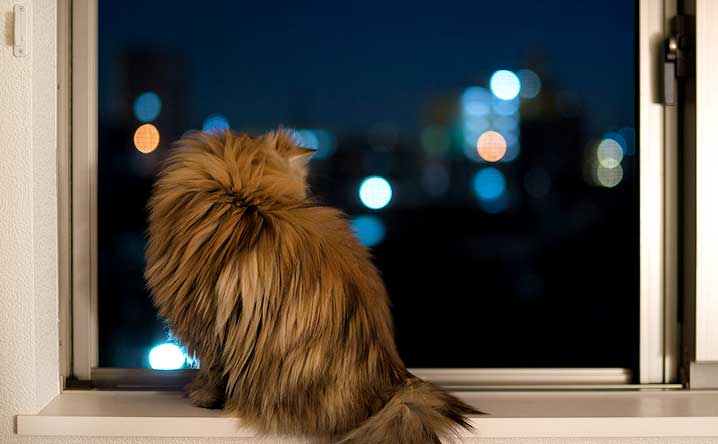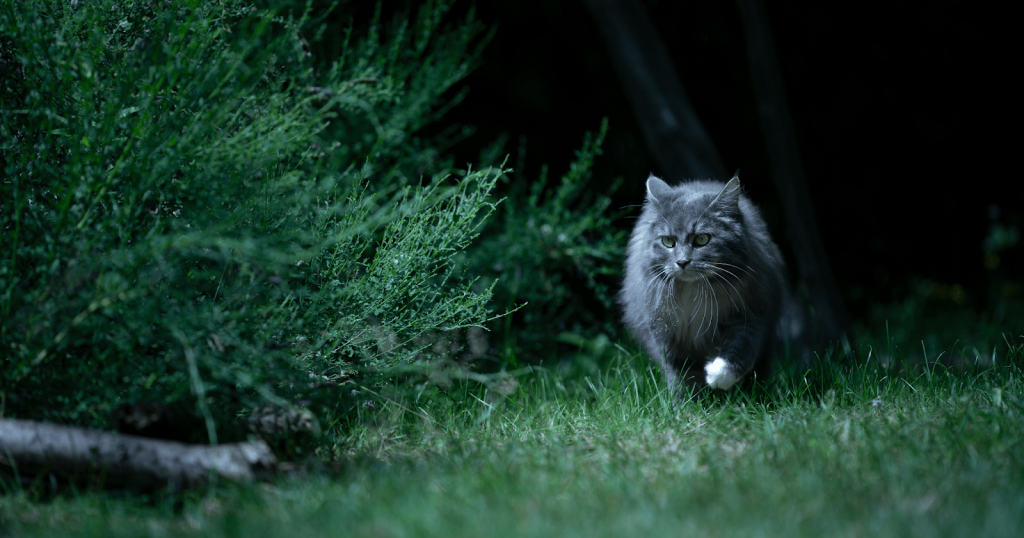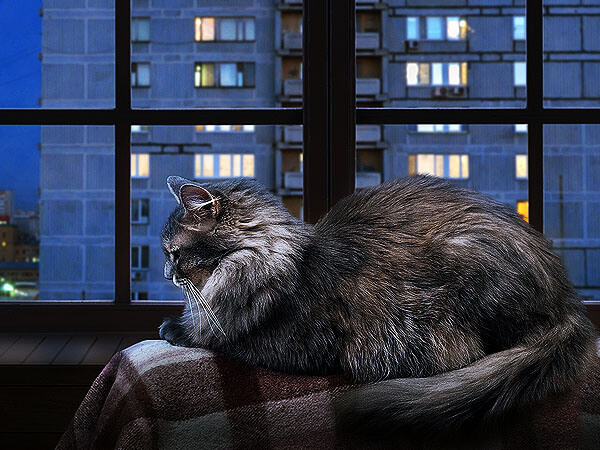Scratching at the door, kicking the pillow or the cat’s rude attempts to wake you up with its paw in the cat friend’s face: it can happen that a house cat doesn’t want to accept that the person is sleeping at night.
If the cat is new to the household or has to cope with changes, such behavior can easily deprive people of sleep. If you recognize the causes and act accordingly, such often stressful attacks of night-active disturbances will soon subside.

Table of Contents
Understand causes
By nature, cats hunt for prey at night and at dusk and then they sleep all day. However, most domestic kittens get used to their owners’ waking and sleeping rhythms after a while.
If your cat does something at night, it’s not at all unusual. Things can get stressful when the cat starts scratching on doors, whines and screams and puts a lot of strain on the nerves of cat lovers.
First of all, it is always good to know the reasons for this behavior. In addition to the natural night-active activity, the cat’s night-active terror can also simply be a search for affection, for example when the bedroom door is closed at night. The animal then simply wants to go to its human friend and is not easily dissuaded.
Through the eyes of the cat
If you put yourself in the cat’s shoes, it quickly becomes clear that he cannot understand that the bedroom door is open during the day and closed at night. She will show you her lack of understanding by scratching at the door and making all sorts of cat noises. As a cat lover, you should remain consistent. If you deny the cat access to the bedroom, you should stick with it. The cat will only accept clear behaviors and prohibitions that the cat lover consistently takes to heart and sticks to.
Cats live at their own pace
On average, a cat sleep schedule is about 15 hours a day. In nature, cats are also used to eating smaller meals throughout their waking hours. After being together for a while, cats adapt to people’s waking and sleeping phases. But that doesn’t mean that the cats are awake during the day and sleep all night. Rather, they distribute their rest periods across the parts of the day when their owners are at work or fall asleep.
It then becomes clear that a cat that mostly sleeps during the human working day is at its best in the evening, after all, it is rested and now wants to experience something. Completely in contrast to people who then want to be left alone.
A good way to get cats used to the sleep phases that are important for humans is to spend a lot of time with the cat and offer it food immediately afterwards, just before going to bed. By playing and running around, the cat gets tired and can then enjoy a period of rest with a well-filled stomach. Give your cat another small night ration. In the best case scenario, she will soon no longer have a reason to wake up her human friend at night.

Research into causes – Why does Mieze do this?
A common reason for nighttime disturbances is simply that your cat is hungry. Your organism is prepared for many small meals throughout the day and often has to endure periods of hunger when living with us. Ideally, your cat gets a small meal every four to six hours to ensure it is fed according to its physiology. If this is not possible at night, for example, automatic feeders can also release fresh wet food at the set time. Fiddle boards from the market or self-made, individual pieces of food laid out in the apartment and licking mats for wet food can keep your cat wonderfully occupied in addition to just satiety and thus make the boring hours of the crepuscular more exciting. You’ve killed two birds with one stone, because boredom is at least as common a factor in nighttime riots.
Stay consistent and don’t reward wrong behavior
If there is no improvement after a few days and hunger has been ruled out as the cause, it is recommended to keep the bedroom entrance closed and ignore the nighttime disturbances as much as possible. Aids such as ear plugs for humans can also help. Be consistent and tell the cat that aggressive and loud behavior is not welcome. In no case does shouting loudly help, as this will confirm the cat’s belief that now is the time for activity at night.
Correctly assess nighttime activity
Over time, cats understand that human sleep time begins when the lights go out. However, it is in the cat’s nature that it does not “sleep through the night” like humans like to do. If the nighttime disturbances suddenly occur in a cat that is used to the human rhythm, you should speak to a veterinarian. Then causes other than insufficient habituation, hunger or curiosity could play a role.
Rituals help you and your cat – not just at night
The more regularly and species-appropriately your cat is occupied throughout the day, the more relaxed it will ultimately be able to spend the night. Also help her adjust to your rhythm through a structured daily routine and a bedtime routine. Just before going to bed, let your cat have another blast with an intensive play session. Make sure that your game ends slowly and that your bundle of energy can adjust to the quieter phase that follows. Nothing is more frustrating than being interrupted in the middle of the greatest game. A cool down phase slowly brings them down. The snack that follows can be a little larger so that the day always ends in the same way as a bedtime ritual.
Why is my cat nocturnal?
There are several reasons why your cat might be night-active. Here are six possible explanations:
Natural hunting instinct: Many prey animals, such as mice, are more active at night. Therefore, your cat may use its energy to hunt and play.
Genetic predisposition: Some cat breeds such as the Sphynx or the Bengal cat are naturally night-active. This is due to their genetic makeup and is part of their behavior pattern.
Boredom or under-stimulation: When cats are not mentally or physically busy during the day, they may become active at night to burn off their energy and keep themselves occupied.
Changes in the environment: A new pet or a change in your own schedule can affect your pet’s sleep cycle and cause your cat to become night-active.
Insomnia due to vitamin deficiency: It may also be that you are not feeding your cat a species-appropriate diet. This can lead to a B12 deficiency, for example.
Health problems: Pain, discomfort or some diseases such as hyperthyroidism also cause your cat to suddenly become night-active. Visit a veterinary practice to rule out possible health problems.

10 tips against animal sleep robbers
1. Cat nocturnal: Play with it enough To ensure that your cat is well-used for a good night’s sleep, you should play with him for at least an hour a day. Cat toys that your cat can use to entertain themselves can also be used. Bonus points if you really work it out before going to sleep.
2. Insider tip: A silent toy In case your cat wants to keep himself busy at night, a quiet toy is good. It’s best to take one that doesn’t have any bells and place it far away from the bed.
3. A seat by the window: Encourage your cat to play and hunt independently . This can be, for example, in the form of a seat by the window so that your kitty can watch birds. It’s best to put a birdhouse with food outside and you’ll have entertainment.
4. Leave some food out overnight In the wild, cats eat 10 to 20 small meals throughout the day (and night). So leave some food in her bowl overnight so your cat can have a little midnight snack and not wake you up when she’s hungry.
5. Just ignore it If your cat keeps meowing non-stop and you’ve taken all the necessary measures, there’s only one thing left to do: ignore it ! Sometimes you need a long breath or a pair of earplugs.
6. Cat night-active? Clear rules help If your cat is night-active, it is important to set clear rules right from the start. For example, get your cat used to the closed bedroom entrance and ignore the meowing, at least at night. Especially when you know everything is okay.
7. Daily routines Just like us, cats like a routine that they can get used to. This includes fixed feeding times, play times and other habits. With a clear, fixed routine, your cat will also get used to fixed bedtimes.
8. Cuddling under the covers Does your cat like to sleep in your bed ? Then use the time to cuddle together. How to prevent your cat from becoming night-active by calming him down and making him tired.
9. An animal roommate Playing with people is often not enough to make a cat happy . Cats, contrary to what most people think, need the company of other members of their species. If your cat is night-active, a second cat can solve the problem.
10. Classify nocturnal activity In nature, cats have periods of wakefulness throughout the night. It is completely normal for them to get up at night, eat, drink or go to the toilet. If your cat is suddenly active every night, you should ask a veterinarian for advice.
CONCLUSION
Cats are naturally night-active. When living with their two-legged friend, they usually adapt to their day-night rhythm, but without sleeping through the entire night.
If you remain patient and consistent and there are no medical reasons for your cat’s nighttime activity, he will usually quickly reduce or even stop his nighttime activities. But of course you have to do something for that – lots of romping and playing followed by a midnight snack is part of your job!
FAQs
Q: Why are cats most active at night?
A: Cats are crepuscular animals, meaning they are most active during dawn and dusk. This natural behavior can make your cat awake and active at night.
Q: How can I manage my cat’s night activity to let me sleep at night?
A: You can train your cat to sleep during the day by engaging in playtime and interactive activities during the evening to help tire them out. Additionally, create a comfortable sleeping environment for your cat and try to keep a consistent routine to help them understand when it’s time to sleep.
Q: How can I get my cat to sleep at night if it’s keeping me awake?
A: Try to establish a bedtime routine for your cat by engaging in calming activities before bedtime. Avoid punishing your cat for being active at night, instead provide a safe and comfortable space for them to rest.
Q: Is it possible to train an older cat to sleep at night?
A: While it may be more challenging to train an older cat compared to a kitten, you can still establish a bedtime routine and provide a comfortable sleeping environment to encourage your older cat to sleep at night.
Q: Why do cats often disturb their owners at night?
A: Cats may spend the daytime sleeping and become more awake and active at night due to their crepuscular nature. Understanding and fulfilling your cat’s needs during the day can help reduce nighttime disturbances.
Q: What are some ways to keep my cat awake during the day to promote nighttime sleep?
A: Engage in interactive play sessions, provide mental stimulation, and create a stimulating environment during the day to help keep your cat awake and active. This can help regulate your cat’s sleep-wake cycle.